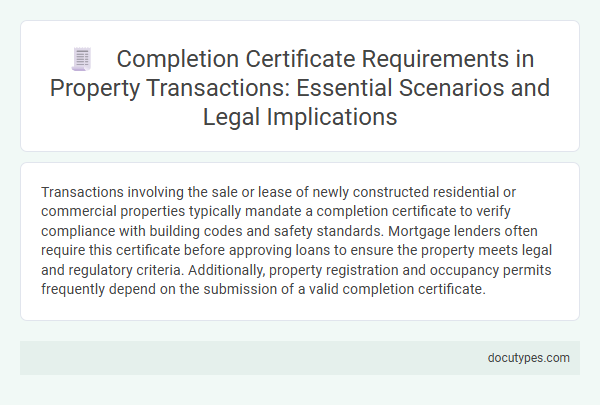Transactions involving the sale or lease of newly constructed residential or commercial properties typically mandate a completion certificate to verify compliance with building codes and safety standards. Mortgage lenders often require this certificate before approving loans to ensure the property meets legal and regulatory criteria. Additionally, property registration and occupancy permits frequently depend on the submission of a valid completion certificate.
Understanding Completion Certificates in Property Transactions
A completion certificate is a crucial legal document issued by local authorities confirming that a property complies with approved building plans and regulations. It certifies that construction is complete and the property is safe for occupation.
Transactions such as property sales, mortgage approvals, and leasing often mandate a completion certificate to ensure the property meets statutory standards. You must obtain this certificate before finalizing transactions to avoid legal complications and ensure clear property titles.
Legal Framework Governing Completion Certificates
Completion certificates are essential legal documents in property transactions, confirming that construction complies with approved plans and regulations. Transactions involving the sale or mortgage of newly built properties mandate obtaining a completion certificate to ensure legal compliance and buyer protection. Your property transfer will not be legally recognized without this certificate, as it forms part of the regulatory framework set by municipal authorities and construction laws.
Key Scenarios Requiring a Completion Certificate
A completion certificate is a critical document verifying that a property complies with all construction and safety norms. It is mandatory in several types of real estate transactions to ensure legal and structural legitimacy.
- New Property Registration - A completion certificate is required to register a newly constructed property with the local municipal authority.
- Property Sale and Purchase - Buyers must obtain a completion certificate to confirm the property's readiness and compliance before finalizing a sale.
- Mortgage Application - Financial institutions demand a completion certificate before approving loans against the property.
Essential Documents for Obtaining a Completion Certificate
A Completion Certificate is mandatory for various property-related transactions, ensuring that the construction adheres to approved plans and safety standards. Obtaining this certificate requires submitting essential documents that validate compliance.
- Building Plan Approval - Official approval of the property's layout and design by local authorities.
- No Objection Certificate (NOC) - Clearance from relevant departments confirming no violations or objections.
- Occupancy Certificate Application - Formal request indicating the building is ready for occupation after meeting all regulations.
Your submission of these critical documents facilitates a smooth process toward acquiring the Completion Certificate for your property.
Role of the Completion Certificate in Property Registration
A Completion Certificate is essential in property transactions involving new constructions or major renovations. It verifies that the building complies with local regulations and is safe for occupancy.
Property registration processes often require this certificate to confirm legal approval of the structure. Your property transaction cannot proceed without presenting the Completion Certificate to the relevant authorities.
Legal Implications of Missing Completion Certificates
What types of property transactions mandate a completion certificate? Property sales and mortgage approvals typically require a completion certificate to ensure the building meets legal and safety standards. Missing this certificate can lead to legal disputes and difficulties in securing financing.
Why is obtaining a completion certificate crucial in real estate transactions? A completion certificate validates that construction complies with approved plans and local regulations. Without it, buyers may face challenges in registering the property and risking penalties or fines.
How does the absence of a completion certificate affect property registration? Registration authorities often demand a completion certificate to process ownership transfer. Lack of this document can result in rejected applications, delaying or invalidating the sale.
What legal risks arise from missing completion certificates in property deals? Missing certificates expose parties to potential litigation over non-compliance with building codes. This can undermine property value and complicate future resale or development.
Impact on Loan and Mortgage Approvals
Completion certificates are essential for transactions involving property sales, transfers, and mortgage applications. These certificates confirm that a building complies with approved plans and local regulations.
Mortgage lenders require completion certificates to verify the property's legality and structural safety before approving loans. Without this certificate, loan approval may be delayed or denied due to increased risk. Completion certificates also impact property insurance and resale value, influencing overall financial agreements.
Completion Certificate and Property Tax Assessment
| Transaction Type | Requirement | Relevant Authority | Purpose of Completion Certificate | Relation to Property Tax Assessment |
|---|---|---|---|---|
| Property Sale | Completion Certificate mandatory | Local Municipal Corporation / Building Authority | Confirms construction complies with approved plans and is safe for habitation | Serves as proof for property tax assessment and registration |
| Property Registration | Completion Certificate required | Registrar's Office / Sub-Registrar | Used to verify condition and legitimacy of the property before registering ownership | Mandatory document for updating property tax records |
| Obtaining Occupancy Rights | Completion Certificate essential | Municipal Building Department | Validates eligibility for occupying the property legally | Influences property tax classification and assessment rates |
| Property Mortgage / Loan Approval | Completion Certificate often required | Financial Institutions / Banks | Ensures the property has been legally completed before financing | Supports accurate valuation aligned with tax assessments |
| Property Tax Assessment | Completion Certificate used as verification | Municipal Tax Department | Confirms the built structure and facilities for correct tax computation | Directly impacts the property tax demand and liability |
Remedies for Absence of Completion Certificates
Completion certificates are mandatory for residential property sales, commercial real estate transactions, and government-regulated construction projects. Without a valid completion certificate, your property transaction may face legal disputes, delays in registration, and difficulties in securing financing. Remedies include obtaining a retrospective completion certificate, pursuing legal action for compliance, or negotiating indemnity agreements to protect your interests.
What Types of Transactions Mandate a Completion Certificate? Infographic

